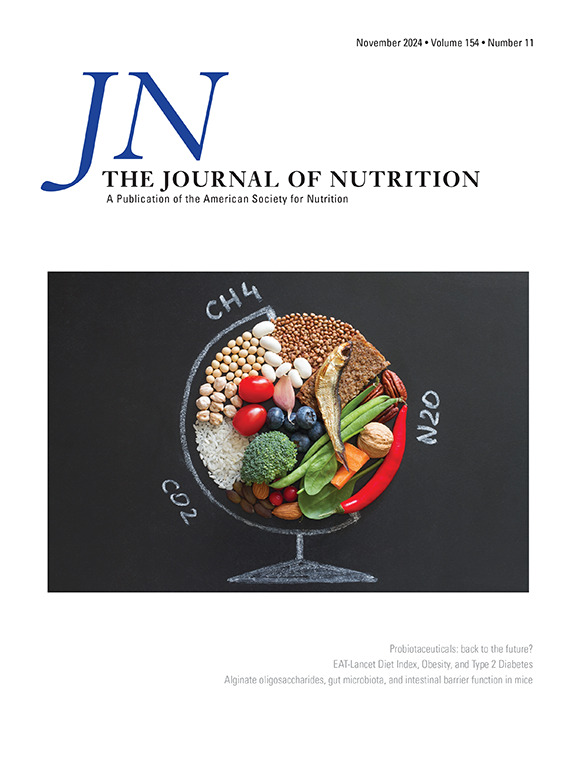Hemoglobin During Pregnancy Does Not Mediate the Relationship between Nutrition Supplements and Intrauterine Growth: A Secondary Data Analysis of Women First Preconception Nutrition Trial
IF 3.7
3区 医学
Q2 NUTRITION & DIETETICS
引用次数: 0
Abstract
Background
Nutrition supplements such as multiple micronutrient-fortified small-quantity lipid-based nutrient supplementation (SQ-LNS) consumed either before or during pregnancy have been shown to improve intrauterine growth, but the mechanisms through which the supplements improve intrauterine growth remain unclear.
Objectives
We examined whether hemoglobin (Hb) during pregnancy could be a potential mechanism through which multiple micronutrient-fortified SQ-LNS improve intrauterine growth.
Methods
We used data collected from women and newborns in a randomized controlled trial conducted in Pakistan, India, the Democratic Republic of the Congo, and Guatemala. Women were randomly assigned to consume multiple micronutrient-fortified SQ-LNS from preconception until birth (arm 1); consume the SQ-LNS from the second trimester of pregnancy until birth (arm 2); or no supplement (arm 3). Intrauterine growth, expressed as birth length, weight, and head circumference Z-scores, was the outcome. The mediator was Hb (g/dL) measured at 12 (n = 2075) and 32 wk of gestation (n = 2157). Causal mediation analysis was employed to estimate direct and indirect effects.
Results
Hb levels at 12 or 32 wk of gestation did not mediate the relation between the SQ-LNS and intrauterine growth. Indirect effects of preconception SQ-LNS (arm 1) compared with arm 3, mediated by Hb at 12 wk of gestation, were 0.02 [95% confidence interval (CI): –0.02, 0.01], 0.01 (95% CI: –0.01, 0.02), and 0.01 (95% CI: –0.01, 0.02) for length, weight, and head circumference Z-scores, respectively. The corresponding direct effects (95% CIs), not mediated by Hb, were 0.18 (0.09, 0.33), 0.12 (0.03, 0.23), and 0.06 (–0.03, 0.20), respectively. Site-specific and gestational age-adjusted data analyses at 12 and 32 wk of gestation confirmed the findings of no statistically significant mediated effects of Hb during pregnancy.
Conclusions
The observed main effect of multiple micronutrient-fortified SQ-LNS on intrauterine growth was not mediated by Hb levels at 12 or 32 wk of gestation. The findings suggest exploring other pathways implicated in the association between the SQ-LNS and intrauterine growth.
This trial was registered at clinicaltrials.gov as #NCT01883193 (https://clinicaltrials.gov/ct2/show/NCT01883193?term=01883193&rank=1).
妊娠期间的血红蛋白并不介导营养补充与宫内生长之间的关系:妇女第一孕前营养试验的二次数据分析。
背景:营养补充剂,如多种微量营养素强化的小剂量脂质营养补充剂(SQ-LNS)在怀孕前或怀孕期间被证明可以改善宫内生长,但补充剂改善宫内生长的机制尚不清楚。目的:探讨妊娠期血红蛋白(Hb)是否可能是多种微量营养素强化SQ-LNS促进宫内生长的潜在机制。方法:我们使用在巴基斯坦、印度、刚果民主共和国和危地马拉进行的一项随机对照试验中收集的妇女和新生儿数据。妇女从孕前到出生随机服用多种微量营养素强化SQ-LNS(第1组);妊娠中期至分娩期间使用SQ-LNS(组2);或不服用补充剂(组3)。以出生长度、体重和头围z分数表示的宫内生长是结果。介质是在妊娠12周(n= 2075)和32周(n= 2157)测量的Hb (g/dL)。采用因果中介分析估计直接和间接影响。结果:妊娠12周和32周血红蛋白水平不介导SQ-LNS与宫内生长的关系。妊娠12周时由Hb介导的孕前SQ-LNS(第1组)与第3组的间接影响分别为0.02 (95% CI: -0.02, 0.01)、0.01 (95% CI: -0.01, 0.02)和0.01 (95% CI: -0.01, 0.02),对长度、体重和头围z评分的影响为0.01 (95% CI: -0.01, 0.02)。非Hb介导的相应直接效应(95% ci)分别为0.18(0.09,0.33)、0.12(0.03,0.23)和0.06(-0.03,0.20)。在妊娠12周和32周的位点特异性和胎龄调整数据分析证实,妊娠期间Hb没有统计学上显著的介导作用。结论:观察到的多种微量营养素强化SQ-LNS对宫内生长的主要影响不是由妊娠12周或32周的Hb水平介导的。这一发现提示我们探索与SQ-LNS和宫内生长相关的其他通路。试验注册:ClinicalTrials.gov #NCT01883193;https://clinicaltrials.gov/ct2/show/NCT01883193?term=01883193&rank=1。
本文章由计算机程序翻译,如有差异,请以英文原文为准。
求助全文
约1分钟内获得全文
求助全文
来源期刊

Journal of Nutrition
医学-营养学
CiteScore
7.60
自引率
4.80%
发文量
260
审稿时长
39 days
期刊介绍:
The Journal of Nutrition (JN/J Nutr) publishes peer-reviewed original research papers covering all aspects of experimental nutrition in humans and other animal species; special articles such as reviews and biographies of prominent nutrition scientists; and issues, opinions, and commentaries on controversial issues in nutrition. Supplements are frequently published to provide extended discussion of topics of special interest.
 求助内容:
求助内容: 应助结果提醒方式:
应助结果提醒方式:


